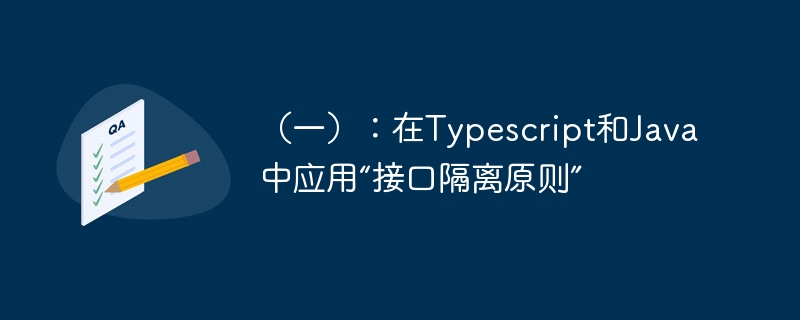◎欢迎参与讨论,请在这里发表您的看法、交流您的观点。
(一):在Typescript和Java中应用“接口隔离原则”
ID:19339 / 打印
概念
solid 是一个缩写词,代表面向对象编程的五个基本原则,由 robert c. martin(鲍勃大叔)提出。在这里您可以阅读有关他的文章的更多信息。
这些原则旨在改进代码的结构和维护,使其更加灵活、可扩展且更易于理解。这些原则可以帮助程序员创建更有组织的代码、划分职责、减少依赖、简化重构过程并促进代码重用。
缩写中的“i”代表“接口隔离原则”。 bob叔叔用来定义这个原则的一句话是:
“任何客户都不应该被迫依赖他们不使用的界面”
接口隔离原则解决了一个常见问题:接口过大迫使不需要它们的类实现不必要的实现。
实际应用
想象一个应用程序中的身份验证系统,其中使用不同的方法来验证用户身份(例如,通过密码、通过生物识别、通过 qr 码)。
首先我们看一下这个类在java和typescript中不使用isp的情况下的应用:
立即学习“Java免费学习笔记(深入)”;
爪哇
interface authenticator { boolean authenticatewithpassword(string userid, string password); boolean authenticatewithbiometrics(string userid); boolean authenticatewithqrcode(string qrcode); } class passwordauthenticator implements authenticator { @override public boolean authenticatewithpassword(string userid, string password) { system.out.println("authenticating with password..."); return true; } @override public boolean authenticatewithbiometrics(string userid) { throw new unsupportedoperationexception("not implemented"); } @override public boolean authenticatewithqrcode(string qrcode) { throw new unsupportedoperationexception("not implemented"); } } 打字稿
interface authenticator { authenticatewithpassword(userid: string, password: string): boolean; authenticatewithbiometrics(userid: string): boolean; authenticatewithqrcode(qrcode: string): boolean; } class passwordauthenticator implements authenticator { authenticatewithpassword(userid: string, password: string): boolean { console.log("authenticating with password..."); return true; } authenticatewithbiometrics(userid: string): boolean { throw new error("not implemented"); } authenticatewithqrcode(qrcode: string): boolean { throw new error("not implemented"); } } 问题:
- 未使用的方法:passwordauthenticator 类实现了对其功能没有意义的方法。
- 维护麻烦:如果接口发生变化,所有实现类都需要更改,即使它们不使用新方法。
- 单一责任违规:班级开始处理不应该属于他们的问题。
为了解决这个问题,我们可以将authenticator接口拆分为更小、更具体的接口。
爪哇
interface passwordauth { boolean authenticatewithpassword(string userid, string password); } interface biometricauth { boolean authenticatewithbiometrics(string userid); } interface qrcodeauth { boolean authenticatewithqrcode(string qrcode); } class passwordauthenticator implements passwordauth { @override public boolean authenticatewithpassword(string userid, string password) { system.out.println("authenticating with password..."); return true; } } class biometricauthenticator implements biometricauth { @override public boolean authenticatewithbiometrics(string userid) { system.out.println("authenticating with biometrics..."); return true; } } class qrcodeauthenticator implements qrcodeauth { @override public boolean authenticatewithqrcode(string qrcode) { system.out.println("authenticating with qr code..."); return true; } } 打字稿
interface PasswordAuth { authenticateWithPassword(userId: string, password: string): boolean; } interface BiometricAuth { authenticateWithBiometrics(userId: string): boolean; } interface QRCodeAuth { authenticateWithQRCode(qrCode: string): boolean; } class PasswordAuthenticator implements PasswordAuth { authenticateWithPassword(userId: string, password: string): boolean { console.log("Authenticating with password..."); return true; } } class BiometricAuthenticator implements BiometricAuth { authenticateWithBiometrics(userId: string): boolean { console.log("Authenticating with biometrics..."); return true; } } class QRCodeAuthenticator implements QRCodeAuth { authenticateWithQRCode(qrCode: string): boolean { console.log("Authenticating with QR Code..."); return true; } } 重构的好处
- 特定接口:每个类仅实现它实际使用的方法。
- 灵活性:添加新的身份验证方法或模式不会影响现有实现。
- 更简单的维护:减少代码更改的影响,避免不必要的重构。
